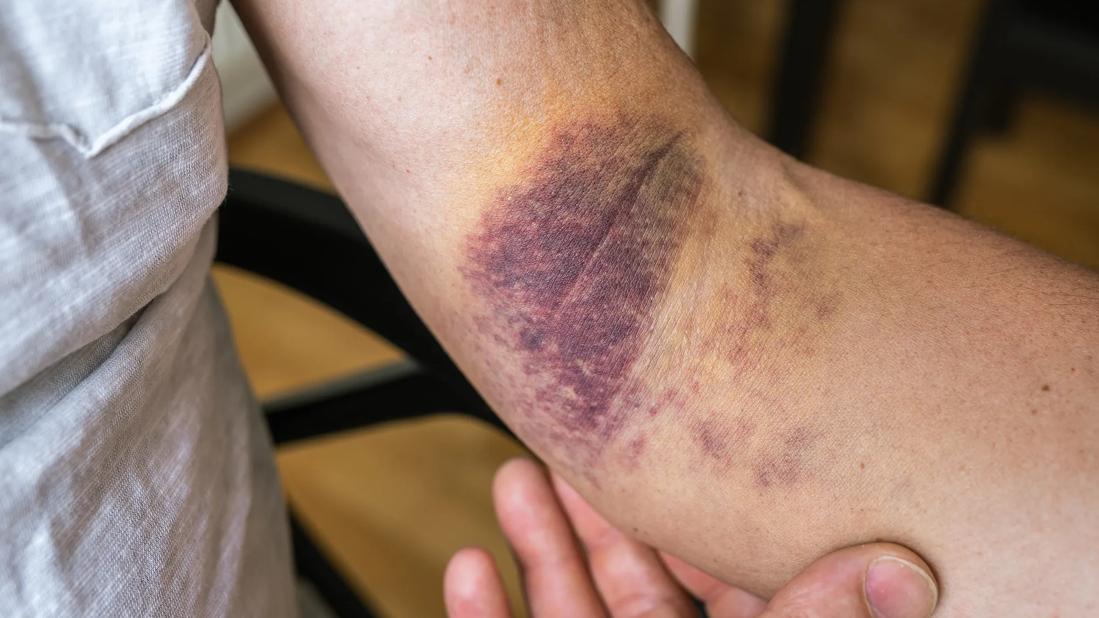Medications, vitamin deficiencies and age can make you bruise more easily

Image content: This image is available to view online.
View image online (https://assets.clevelandclinic.org/transform/663039c2-de1b-47fb-9f40-f9faf3e992ca/bruises-arms-2091965163)
Deep purple bruise on the inside of elbow
You’re stepping into the shower when you notice a shiny new bruise. You don’t remember bumping into anything, but the evidence is right there in black and blue.
Advertisement
Cleveland Clinic is a non-profit academic medical center. Advertising on our site helps support our mission. We do not endorse non-Cleveland Clinic products or services. Policy
It can be unsettling to find a bruise you can’t explain, or to see an angry welt appear from something as minor as brushing against a doorway.
You might wonder if something is wrong with you. And you can feel vulnerable or self-conscious about the marks that everyday bumps can leave on your body.
We talked with hematologist Dana Angelini, MD, about why some people bruise more easily and when to talk to a doctor.
Bruising happens when small blood vessels break and leak blood under your skin. Usually, you’ll see them following a fall or a trauma.
“It’s common to bump into things, not remember, and see small bruises on your legs or arms,” Dr. Angelini says. “But frequent or unprovoked bruising on your torso, back or face is unusual.”
Bruises usually start off red or purple. As they heal, they may turn brown, green or yellow. The area often is swollen, tender or painful.
Everyone gets bruises from time to time. But bruising easily may signal an underlying issue. Dr. Angelini shares some of the most common reasons.
Taking certain medications and supplements can make you more likely to bruise.
“Even over-the-counter medications and supplements can inhibit normal platelet function and cause bruising,” Dr. Angelini explains.
Advertisement
Platelets are the components in your blood that help it clot, which keeps you from bleeding too much after an injury. When they’re not working effectively, it can cause excessive bleeding and bruising.
Always talk with a healthcare provider about the medications and supplements you take. They can affect how your blood clots, interfere with other medications and have other unintended effects.
Common medications associated with easy bruising include:
Not getting enough of certain nutrients in your diet can weaken your blood vessels or impair clotting, making you more likely to bruise. Common vitamin deficiencies that lead to easy bruising include:
If you’re concerned that you may have a vitamin deficiency, talk with a healthcare provider. They can help you get the nutrients your body needs and decide if supplements are necessary and safe for you.
Older adults tend to bruise more easily. That’s because your skin can become thinner as you age. That means less fat beneath your skin to cushion and protect your blood vessels.
Some underlying medical conditions can impair clotting or platelet function and make you bruise like a peach. They include:
Advertisement
Heavy alcohol use and poor nutrition can both interfere with blood clotting. Alcohol affects liver function and bone marrow function.
Most bruises from minor injuries heal on their own in a week or two. But it’s a good idea to see a healthcare provider if a bruise:
If medication is the likely cause, your doctor may explore other options.
“We’ll do a risk-benefit analysis,” Dr. Angelini explains. “If the bruising is severe or interfering with your daily life, we can talk about switching to another medication.”
If the cause remains unclear, a blood test can help identify platelet or clotting issues.
And remember, it’s always OK to ask for help. “We do a lot of consultations for bruising,” she encourages. “When a serious bleeding disorder is ruled out, we’re happy to provide reassurance.”
Advertisement

Sign up for our Health Essentials emails for expert guidance on nutrition, fitness, sleep, skin care and more.
Learn more about our editorial process.
Advertisement
Both are a collection of blood in your brain, but they happen in different parts, for different reasons and with different symptoms
On average, bruises last one to three weeks, and bigger bruises last longer than smaller ones
Dressing in multiple layers, drinking warm liquids and taking breaks indoors can help prevent these cold-weather injuries
Chilblain-like skin lesions and rashes are mild (and rare) complications of many viral infections, not just COVID-19
Babies are born with very little of this vitamin, which plays a critical role in the blood clotting process
Both inflammatory conditions have varying triggers and symptoms
You’ll work with your provider to weigh the pros and cons of different medications
Stress, dental work and repetitive motions are just a few of the many HAE triggers
Although it could be used as a moisturizer, this new trend is not recommended
Communicating clear limits helps protect your time, energy and emotional well-being
High cholesterol can be genetic, but testing and treatment can lower your heart disease risk